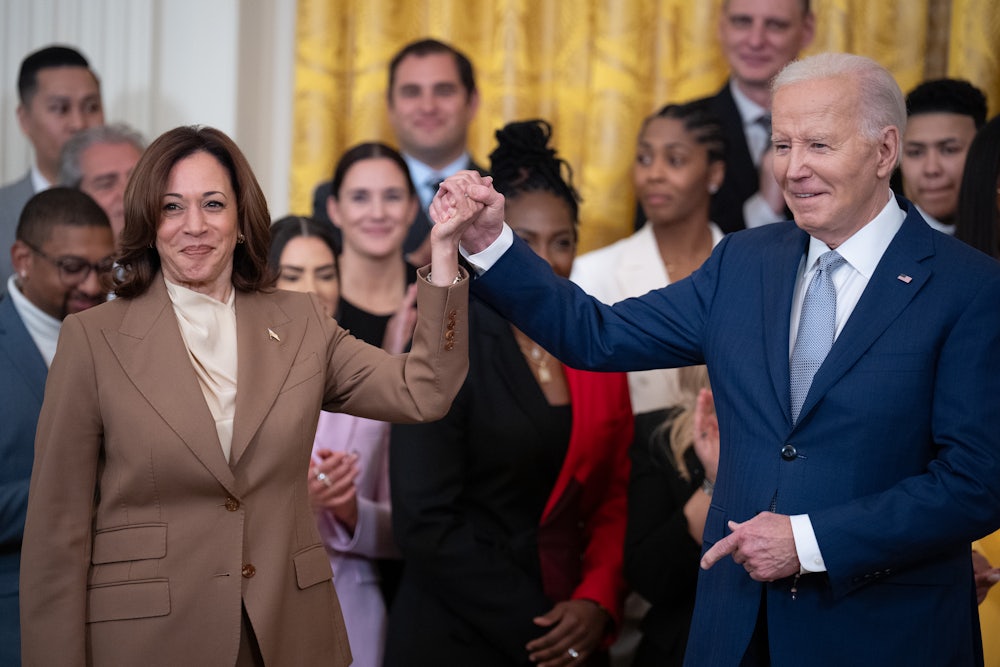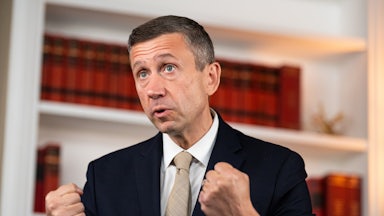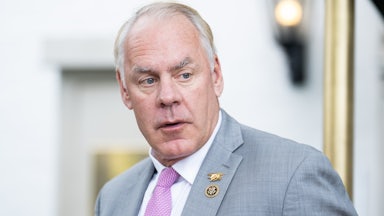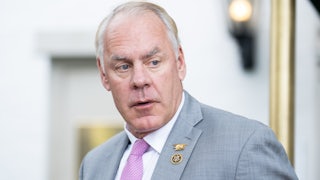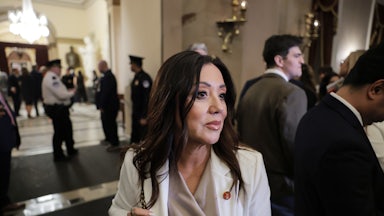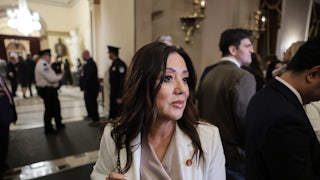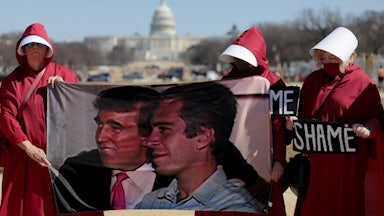With this week’s release of the Jake Tapper–Alex Thompson book about Joe Biden’s deterioration and the determination of the Biden “Politburo” (his three top aides) to hide his infirmities from the American people and even the rest of the White House staff, we’re going to be treated to a primo week or two of #demsindisarray. Usually, these Democratic self-flagellations are excessive and pointless. This one is needed.
The book is called Original Sin, and the authors explain why they borrowed the phrase for their title this way: “The original sin of Election 2024 was Biden’s decision to run for reelection—followed by aggressive efforts to hide his cognitive diminishment.” That’s certainly true. But the party made another mistake that it needs to examine and learn from: the automatic anointing of Kamala Harris after Biden dropped out, and the reasons behind that.
That was the real error, and that—the unquestioned elevation of someone who quite frankly had frequently demonstrated political tone deafness during her tenure as vice president—is what must never happen again.
Before I get into everything, let’s note that on Sunday, Biden was also diagnosed with what The New York Times reported as an “aggressive” form of prostate cancer that had “metastasized to the bone.” Obviously, one wishes Biden and his family the best under these difficult circumstances. We know that prostate cancer is considered a more survivable form of the disease, and one hopes that’s the case here.
But what happened last year still needs to be examined. The Biden team did a disservice to their party and country. According to press accounts, the book (which I’ve ordered, not read—it’s arriving Tuesday) properly places much blame on the so-called Politburo—Steve Ricchetti, Mike Donilon, and Bruce Reed. But this also comes down to Biden himself, and to his wife, Jill. A spouse alone has the power to confront the person she loves with an unwelcome truth. From everything we know, she did the opposite.
It all might have been understandable for a while, but not after the disastrous June 27 debate. That was a Thursday; Biden should have dropped out by that next Sunday. There would have been plenty of time for a mini-primary—something I felt became necessary by the time the debate was over. The convention wasn’t until August 19.
Instead, Biden doubled down. Remember the George Stephanopoulos interview the following Friday? “If the Lord Almighty came down and said, ‘Joe, get out of the race,’ I’d get out of the race,” he said. “The Lord Almighty’s not coming down.” He stood down on July 21. And remember, he was diagnosed with Covid on July 17—he might never have backed down if not for that.
Let’s be fair and remember that in late 2023, say, which would have been a good time for Biden to announce his retirement, his infirmity wasn’t as obvious as it seems in retrospect. Or let’s put it this way: His decline was apparent; but it wasn’t shocking until that debate. And even though it was apparent, another truth was equally clear in late 2023: that if it wasn’t going to be Biden, it was very likely to be Harris, and that prospect, in the early months of 2024, was exciting to … not one single person I knew. In fact, it was the likelihood of a Harris candidacy that made most people in my circles, including me, accept Biden running again as the less-bad alternative.
This too is something on which the Democratic Party as a whole needs to ruminate. It’s even more important that they reflect on this than on Team Biden’s dishonesty. How did someone who never exactly bowled anyone over with her political acumen get to be the vice president of the United States—and the presumptive and unchallenged and unchallenge-able presidential nominee—in the first place?
If we hop in the Wayback Machine to August 2020, we see articles like this one, featuring 13 women Biden was considering. Yes, Biden had said the post was definitely going to a woman. That seemed like the right thing at the time. Women voters lean Democratic, and especially against Donald Trump and Mike Pence, it was totally defensible to think a woman would add something to the ticket.
Furthermore, deciding as Biden did to make history by choosing a woman of color is totally defensible. Some people sneer about political correctness or wokeism. But discrimination is real. So is history. And there is a long, long history of women, and Black women in particular, facing massive discrimination in even liberal circles but still fighting for justice and for the Democratic Party. Rosa Parks and Fannie Lou Hamer and Shirley Chisholm and Barbara Jordan and many others are testament to that fight. Biden deserves credit for trying to change that history.
Harris was the betting favorite for veep at the time. She led most lists, like this one at Vox in July 2020. I remember thinking that Tammy Duckworth would be a great choice, being an injured war veteran and all, and I may have shared that with some friends. But after Harris was named, I wrote (I was at the Daily Beast at the time) that she was the right choice, mainly because she was the expected choice, and Biden was leading in the polls, and when you’re leading in the polls, you don’t need to throw weird curve balls at people. And she gave a great convention speech and did fine on the Covid-limited campaign trail.
But then she became vice president, and her weak ear for the art of politics quickly showed itself. You can hate Joe Manchin and Kirsten Sinema all you want, but for Harris to do an interview with West Virginia and Arizona television stations in the first week of Biden’s presidency in a clunky effort to pressure them to back Biden’s plans—reportedly without even telling the West Wing!—was some astoundingly horrible political judgment.
There were many other examples (remember “The border is secure” from 2022?), and lots of rumors about staff, all contributing to the view that she was in over her head. Alongside these deficiencies was the core one, which I noticed back in 2019 and which is fundamentally what sunk her last year: Coming from the law enforcement and civil rights background as she did, she had very little intuitive feel for economics.
And yet, everyone knew in late 2023 and early 2024 that there was simply no chance on earth that if Biden stood down, the Democrats would nominate anyone but Harris. It was partly because she was the sitting vice president. It was partly because everyone assumed Biden would endorse her, which he did. But it was also partly because she was a Black woman.
This is the downside of the identity politics coin. Yes—women and people of color should be promoted and given opportunities these days that their forbears were denied. Biden’s commitment to naming a woman vice president and a Black woman as his first Supreme Court nominee was laudable. No one can possibly know if Harris was the “best” choice for veep or Ketanji Brown Jackson the “best” choice for the court. But no one knew if a particular person was the best choice back when they were all white men. Was Estes Kefauver the best veep choice Adlai Stevenson could have made in 1956? Was Byron White the best choice JFK could have made for the Supreme Court in 1962? Who knows?
So that’s not the problem. But the problem came when Biden dropped out. Everyone I knew—everyone—was worried about whether Harris was up to it. The top Democrats who’ve shown pretty shrewd political judgment in recent history—Barack Obama and Nancy Pelosi—were worried. They should have said so earlier.
But it’s not really their fault. The blame rests with the values system that liberalism and the party have inculcated. Promoting people because of gender or race is fine. More than fine. It’s necessary and admirable. But using gender and race to help stop a conversation that everyone knows is desperately necessary is wrong.
And everyone did know that that conversation was necessary. The party needed Biden to drop out by July 1, not endorse Harris, and have an open mini-primary. Maybe Harris would have won that primary. Good! She’d have been a stronger candidate!
Intriguingly, the Harris who first came out of the gates was just great. I thought, gee, maybe I’ve misunderestimated her. She’s fire. But by about the midway point of those 107 days, her flaws—the flaws we all knew—made themselves manifest. She had nothing interesting or visionary to say about economics. And her political instincts were bad—being generally cautious, not separating herself even a little bit from Biden on Israel and Gaza, saying that atrocious thing on The View. In a primary that ran from July 1 to the August 19 convention, we’d have been able to take the measure of her more fully.
So, as the Democrats reflect on the mistakes they made with respect to Joe Biden, they need to remember that they made two big blunders, not just one. They denied reality twice. First in wishing away Biden’s decline. But second, and I’d say more costly, in not doing what they obviously should have done and making Kamala Harris earn it. Millions of Americans are now paying the price of their lack of courage.
